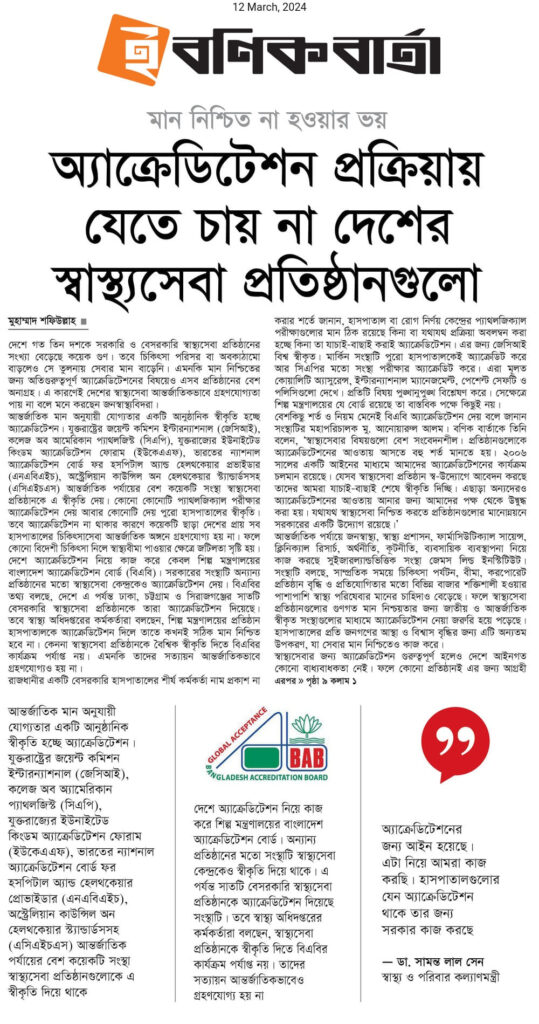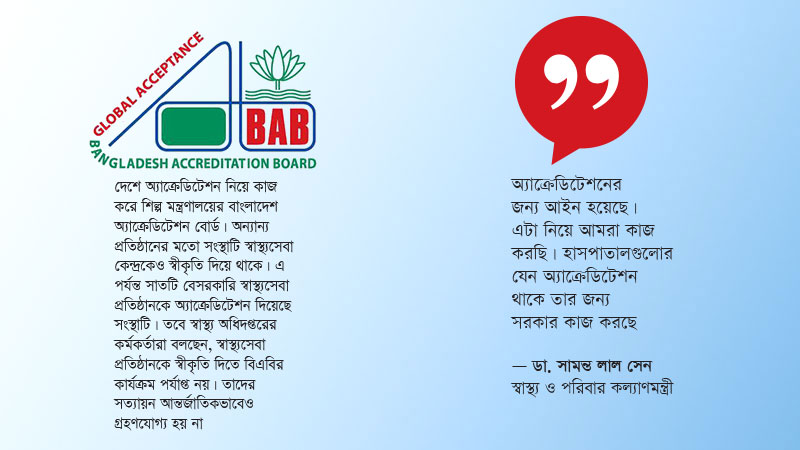The number of public and private healthcare institutions in the country has increased several times in the last three decades. However, the quality of service has not improved despite the expansion of medical range and infrastructure. Even crucial accreditation for quality assurance is largely overlooked by these institutions. Consequently, public health experts believe that the country’s healthcare system lacks international acceptance.

Accreditation involves formal recognition of qualifications according to international standards. Organizations such as the United States Joint Commission International (JCI), College of American Pathologists (CAP), United Kingdom Accreditation Forum (UKAF), India’s National Accreditation Board for Hospitals and Healthcare Providers (NABH), and the Australian Council on Healthcare Standards (ACHS) are among those providing accreditation to healthcare institutions. Some accredit pathological examinations, while others accredit entire hospitals. However, due to the lack of accreditation, the medical services offered by almost all hospitals in the country are not recognized internationally, except for a few. Consequently, obtaining health insurance for foreign treatment becomes complicated.
In Bangladesh, the Accreditation Board (BAB) of the Ministry of Industry handles accreditation. This government agency accredits healthcare centers like other institutions. According to BAB, they have accredited seven private healthcare institutions in Dhaka, Chittagong, and Sirajganj thus far. However, officials from the Department of Health argue that accreditation by the Ministry of Industry does not ensure the correct quality, as BAB’s activities are insufficient for providing global recognition to healthcare institutions. Furthermore, their attestation is not internationally accepted.
A senior official from a private hospital in the capital, speaking on condition of anonymity, stated that accreditation verifies the accuracy of pathological tests or diagnoses and ensures proper procedures are followed. JCI is globally recognized for this purpose, accrediting entire hospitals, while organizations like CAP accredit examinations, focusing on quality assurance, international management, patient safety, and policies. In contrast, the Ministry of Industry’s accreditation board plays a minimal role.
The director-general of BAB mentioned that accreditation is granted based on several conditions and rules. Anwarul Alam told Banik Barta, “Healthcare issues are very sensitive. Institutions must meet many conditions to obtain accreditation. Our accreditation process, established by the Act of 2006, is ongoing. We accredit healthcare institutions that apply on a self-initiative basis and encourage others to seek accreditation. The government is committed to improving the quality of institutions to ensure proper healthcare.”
The James Lind Institute, a Switzerland-based organization, works internationally on public health, health administration, pharmaceutical science, clinical research, economics, diplomacy, and business management. According to the company, recent developments in various markets, such as medical tourism, insurance, corporate growth, and competition, have increased the demand for quality healthcare services. Therefore, obtaining accreditation from nationally and internationally recognized organizations has become essential for ensuring quality assurance in healthcare institutions. Accreditation serves as a tool to enhance public trust and confidence in hospitals and to ensure quality of service.
Although accreditation is important for healthcare, there is no legal obligation for it in the country. Consequently, organizations show little interest due to its high cost. A senior official from a renowned private hospital stated that their organization wanted to apply for JCI accreditation, but the high fees made it unfeasible. Accreditation is essentially a commercial product, typically requiring a fee of Rs 40 lakh for pre-accreditation by organizations like JCI, along with additional fees for training, documentation, mock audits, and subsequent renewals every three years. However, without accreditation, foreign patients are reluctant to seek medical services, as their country’s health insurance institutions do not recognize Bangladeshi hospital documents after treatment.
According to data from the Department of Healthcare and the Directorate of Health, the private healthcare sector in the country is larger than the government sector. The country has 640 government hospitals (excluding Union level), while there are over 5,300 approved private hospitals and clinics, more than 10,000 diagnostic centers, and 192 blood banks.
Among the public and private healthcare institutions in the country, only about 10 private hospitals and diagnostic centers have international-level accreditation. Providing this information, three current and former officials of the Department of Health told Bonik Barta, “About a decade and a half ago, the government emphasized accreditation.” The hospital director at the Department of Health primarily addressed the issue. However, those in charge did not prioritize it much. Additionally, there is political pressure to bring private hospitals or diagnostic institutes under accreditation. If one hospital is graded ‘A’ while another is graded ‘C’, there is pressure to comply.
The officials also stated that there are at least 500 conditions and guidelines to ensure the quality of hospitals or diagnostic institutions. The World Health Organization (WHO) has many guidelines. Hospitals are required to adhere to various accreditation conditions set by JCI. However, the process incurs significant costs. The country lacks infrastructure and manpower for accreditation. Moreover, the accreditation culture has not been established.
Former Director of Pathology at the Disease Control and Research Institute (IEDCR), Abu Mohammad Zakir Hossain, told Banik Barta, “There is a crisis of trust in both government and private institutions. Accreditation is necessary in this case. Its primary objective is to ensure all standards of medical care. Every aspect, from infrastructure to the efficiency of every test in hospitals or diagnostic centers, is thoroughly examined.”
Some of the leading private hospitals in the country have accreditation from JCI, CAP, and NABH. Among them, LabAid Hospital achieved NABH and CAP accreditation a few years ago. Regarding this, the managing director of LabAid Group, AM Shamim, told Bonik Barta, “Our hospital holds accreditation from India’s NABH and USA’s CAP, covering pathology and hospital accreditation, respectively. This recognition is crucial to elevate the hospital to international standards. Without it, foreigners are not interested in seeking medical treatment in Bangladesh. In India, accreditation is mandatory for hospitals upon opening, with renewal required every two years.”
Evercare Hospital is also accredited by JCI. In this regard, the hospital’s director of Medical Services, Dr. Arif Mahmud, told Bonik Barta, “When our hospital was established, efforts were made to provide international-quality services. We obtained JCI accreditation in 2008, and six audits have been conducted since then. Many people from the country travel abroad for treatment, seeking care in high-quality hospitals. Accreditation guarantees that quality. JCI, based in the United States, is globally recognized for this.”
According to the World Health Organization’s 2022 publication titled ‘Healthcare Accreditation and Quality Care,’ accreditation primarily evaluates the services and standards provided by healthcare institutions and organizations. This evaluation method reviews health facilities from evidence-based needs, appropriate services, quality levels, clinical, and organizational perspectives.
According to National Institute of Laboratory Medicine and Referral Center Director, Professor Dr. Mohammad Shahed Ali Jinnah, people are less satisfied with the services provided by the country’s healthcare institutions. Achieving accreditation requires ensuring the highest standards, which also entails significant expenditure.
Health and Family Welfare Minister, Professor Dr. Samant Lal Sen, told Bonik Barta, “Accreditation has been enacted. We are working on it. The government is striving to ensure that hospitals obtain accreditation.”

